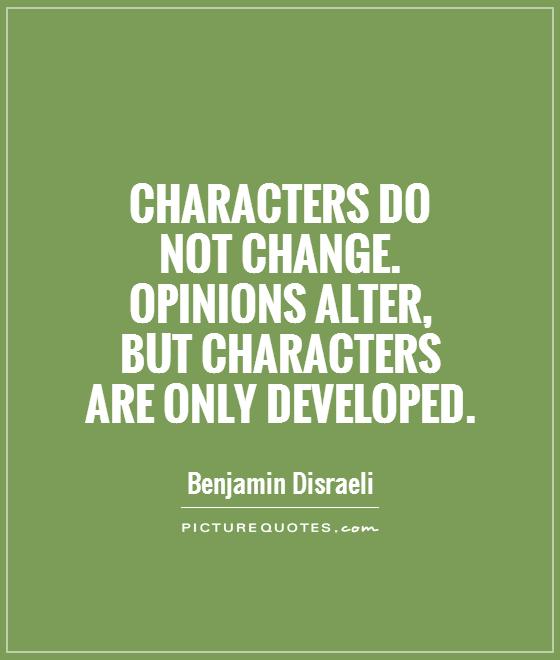Characters do not change. Opinions alter, but characters are only developed

Characters do not change. Opinions alter, but characters are only developed
Benjamin Disraeli, a prominent British statesman and novelist, once famously said, "Characters do not change. Opinions alter, but characters are only developed." This statement holds a profound truth that can be applied to both literature and real life. In the context of Disraeli's words, it can be interpreted that a person's fundamental nature and personality remain constant, while their beliefs and perspectives may evolve over time.In literature, characters are often portrayed as complex individuals with distinct personalities, motivations, and flaws. These traits shape their actions and decisions throughout the story, creating a sense of continuity and consistency in their behavior. While characters may undergo significant growth and development as the plot unfolds, their core essence remains unchanged. This is what makes them relatable and believable to readers, as they can see themselves reflected in the struggles and triumphs of the characters.
In real life, people also exhibit a similar dichotomy between their character and their opinions. Our values, beliefs, and attitudes may shift in response to new experiences, knowledge, and relationships. We may reconsider our views on certain issues, change our political affiliations, or adopt new perspectives on life. However, at the core of our being, our character remains intact. Our inherent traits, such as our temperament, moral compass, and sense of identity, are deeply ingrained and resistant to change.
Disraeli's words suggest that while our opinions may fluctuate, our character is the bedrock upon which our lives are built. It is the foundation that shapes our decisions, guides our actions, and defines who we are as individuals. By recognizing the distinction between opinions and character, we can better understand ourselves and others, fostering empathy, compassion, and growth.












 Friendship Quotes
Friendship Quotes Love Quotes
Love Quotes Life Quotes
Life Quotes Funny Quotes
Funny Quotes Motivational Quotes
Motivational Quotes Inspirational Quotes
Inspirational Quotes